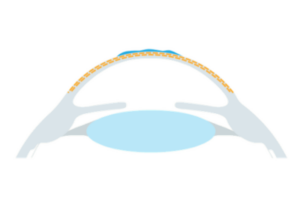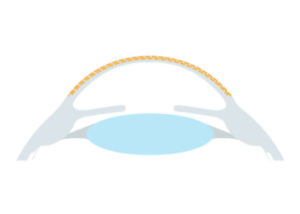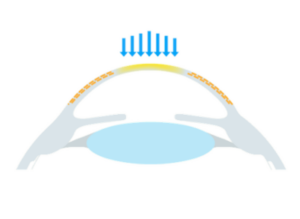Achieve reliable vision through crosslinking against keratoconus
- Find out how minimally invasive crosslinking treatment can halt the progression of keratoconus so you can live worry-free
Crosslinking strengthens your cornea and stops the progression of keratoconus
Find out everything you need to know about crosslinking
Keratoconus is a congenital eye disease in which the cornea becomes thinner and thinner and is deformed into a cone shape.
This corneal curvature increases steadily and the patient notices an increasing deterioration in vision. Corneal transplantation is the final stage of this progressive disease.
In most cases, however, such a transplant can be avoided by crosslinking!
Dr. Victor Derhartunian is a pioneer of the cross-linking method and can use it in combination with laser treatment to improve vision.
Progressive corneal weakness manifests itself in increasing corneal curvature and a constantly changing corneal topography. If the vision is impaired by this process, a strengthening of the cornea by crosslinking can be mentioned. This treatment also flattens the cornea in the long term.
We can determine your suitability for cross-linking treatment by examining your eyes during the initial examination.
The so-called crosslinking of the cornea refers to a cross-linking of the fibres to mechanically stabilize the corneal tissue. Although the disease cannot be reversed in this way, it can at least be halted in its existing state. In many cases, a slow regression of the irregular corneal shape is also observed.
In crosslinking, the cornea is treated with a combination of riboflavin drops (vitamin B2) and UV radiation. This method is also used successfully in other medical fields for other types of tissue, e.g. as a seal at the dentist.
Crosslinking can stop corneal weakness, thereby stabilizing the tissue.
Unfortunately, an improvement in vision is not achieved in most cases.
In order to achieve an increase in vision, this procedure can be combined with other surgical techniques or hard lenses can be fitted.
UV riboflavin crosslinking is now a widely used, safe and effective treatment to halt the progression of keratoconus. Apart from the general surgical risks, there are no known side effects or complications with this method
Today, corneal weakness can only be stopped by UV riboflavin crosslinking. To achieve an improvement in vision, this can be combined with the following techniques:
Crosslinking has been an approved procedure since 2006. Its safety and effectiveness have been confirmed in numerous scientific publications. The continuous development of this procedure is constantly leading to improved clinical results.
Have laser eye surgery now in the center of Zurich – at the Swiss Eye Laser Center. Have you finally had enough of annoying visual aids such as glasses or contact lenses?
Choose the modern treatment option that best suits you to find your optimal laser eye treatment method




Many people around the world have already freed themselves from annoying visual aids such as glasses and contact lenses, but not all eyes are suitable for laser eye surgery at the Swiss Eye Laser Center. Book a free initial consultation at the Zurich City Laser Eye Center right now and find out together with Dr. Victor Derhartunian FEBO and his team of ophthalmologists which laser eye treatment can best help you:
Termin vereinbarenDiscover our laser eye surgeons in the heart of Zurich